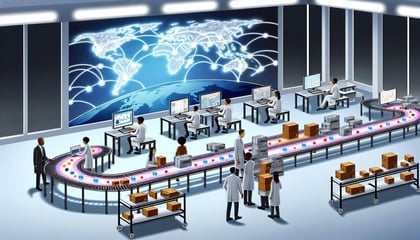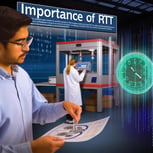Real-Time Tracking and Tracing of Products
From the initial formulation of pharmaceuticals to the assembly of medical devices, precision and efficiency are vital in medical manufacturing. However, ensuring the quality, safety, and compliance of products throughout their lifecycle poses significant challenges. This is where real-time tracking and tracing (RTT) steps in as a game-changer.
In this blog, we'll look into the significance of RTT in medical manufacturing and explore how the integration between PlanetTogether and leading ERP, SCM, and MES systems elevates operational excellence to new heights.

Introduction to Real-Time Tracking and Tracing (RTT)
In essence, RTT is the ability to monitor the movement and status of products at every stage of the supply chain, from raw materials to the end consumer. It involves capturing and processing data in real-time to provide visibility, transparency, and accountability. For medical manufacturing, RTT isn't just a matter of convenience; it's a critical component for ensuring regulatory compliance, mitigating risks, and maintaining product integrity.

The Importance of RTT in Medical Manufacturing
Regulatory Compliance: The medical industry is governed by strict regulations to safeguard patient health and safety. RTT enables manufacturers to maintain compliance with regulations such as the FDA's Drug Supply Chain Security Act (DSCSA) and the EU's Medical Device Regulation (MDR) by providing comprehensive documentation of product provenance and handling.
Quality Assurance: For medical products, quality is non-negotiable. RTT allows manufacturers to monitor key quality metrics in real-time, such as temperature, humidity, and sterilization parameters, to ensure that products meet stringent quality standards throughout the production process.
Supply Chain Resilience: In today's globalized economy, supply chain disruptions are inevitable. RTT empowers manufacturers to proactively identify and mitigate risks by providing real-time insights into inventory levels, production status, and supplier performance, allowing for agile decision-making and rapid response to unforeseen events.
Enhanced Transparency: RTT fosters transparency and trust throughout the supply chain by enabling stakeholders, including regulators, healthcare providers, and consumers, to access real-time information about product origins, handling, and authenticity.

Challenges in Implementing RTT
While the benefits of RTT are clear, implementing a robust RTT system in a medical manufacturing facility is not without its challenges. Some common hurdles include:
Data Silos: Many manufacturing facilities operate using disparate systems for production planning, inventory management, and quality control, resulting in data silos that hinder the seamless flow of information required for effective RTT.
Integration Complexity: Integrating RTT capabilities with existing ERP, SCM, and MES systems can be complex and time-consuming, requiring careful planning, customization, and testing to ensure compatibility and functionality.
Data Security and Privacy: Given the sensitive nature of medical data, ensuring the security and privacy of RTT data is paramount. Manufacturers must implement robust cybersecurity measures and comply with relevant data protection regulations to safeguard against breaches and unauthorized access.
Cost and Resource Constraints: Implementing RTT systems requires investment in technology infrastructure, software licenses, and staff training, which can strain budgets and resources, particularly for smaller manufacturers with limited financial means.
The Role of Integration in RTT
Integration is the key to unlocking the full potential of RTT in medical manufacturing. By seamlessly connecting RTT systems with existing ERP, SCM, and MES systems, manufacturers can overcome the challenges associated with data silos, integration complexity, and resource constraints. One notable integration solution is the integration between PlanetTogether, a leading production planning software, and industry-leading ERP, SCM, and MES systems such as SAP, Oracle, Microsoft, Kinaxis, and Aveva.

Benefits of Integration Between PlanetTogether and ERP, SCM, and MES Systems
Streamlined Data Flow: Integration between PlanetTogether and ERP, SCM, and MES systems enables the seamless exchange of data between production planning, inventory management, and quality control systems, eliminating data silos and ensuring a single source of truth for real-time tracking and tracing.
Enhanced Visibility and Control: By integrating RTT capabilities with production planning systems, manufacturers gain real-time visibility into production schedules, resource availability, and order status, enabling them to optimize production processes, minimize bottlenecks, and meet customer demand with greater agility.
Improved Compliance and Quality Assurance: Integration enables manufacturers to capture and record critical production data in real-time, ensuring compliance with regulatory requirements and facilitating proactive quality control measures to prevent defects and deviations.
Efficient Resource Allocation: Integrated RTT systems provide actionable insights into resource utilization and efficiency, enabling manufacturers to optimize resource allocation, reduce waste, and improve overall operational performance.
Scalability and Flexibility: Integration between PlanetTogether and ERP, SCM, and MES systems is scalable and adaptable to the evolving needs of medical manufacturing facilities, allowing for seamless integration with new technologies, processes, and regulations as they emerge.
Real-time tracking and tracing (RTT) is revolutionizing the landscape of medical manufacturing, offering unprecedented visibility, transparency, and control over the production process. With the integration of PlanetTogether, a leading production planning software, and industry-leading ERP, SCM, and MES systems such as SAP, Oracle, Microsoft, Kinaxis, and Aveva, manufacturers can overcome the challenges associated with data silos, integration complexity, and resource constraints, unlocking new opportunities for operational excellence and regulatory compliance.
As the medical industry continues to evolve, integrated RTT systems will play a central role in shaping the future of medical manufacturing, ensuring the continued delivery of safe, high-quality products to patients around the world.
Are you ready to take your manufacturing operations to the next level? Contact us today to learn more about how PlanetTogether can help you achieve your goals and drive success in your industry.


